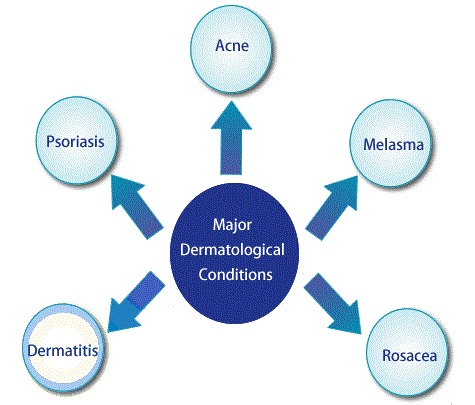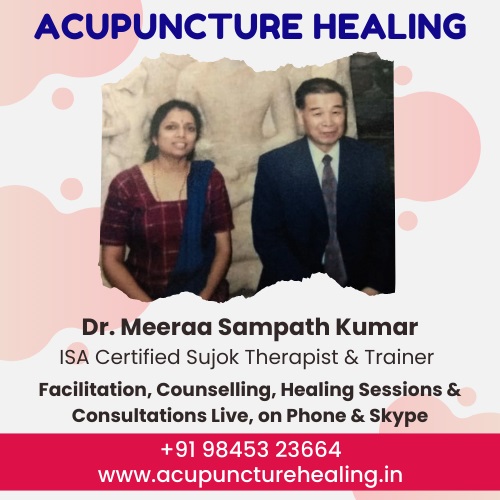Alternative Therapies
- Alternative Medicine
- Access Bars
- Acupressure
- Acupuncture
- Angel Healing
- Ayurveda
- Bach Flower Remedies
- Breathwork
- Cosmetic Acupuncture
- Crystal Healing
- Cupping Therapy
- Emotional Freedom Technique (EFT)
- Ergonomics
- Face Reading
- Fengshui
- Geopathic Stress
- Graphology
- Heal Your Life
- Holistic Solutions
- Holy Fire Reiki
- Homeopathy
- Hypnotherapy
- Jesus Reiki
- Jikiden Reiki
- Lama Fera
- Law of Attraction
- Manual Therapy
- Meditation
- Motivational Counseling
- Mudra Healing
- Nakshatra Energies
- Naturopathy
- Neuro Linguistic Programming (NLP)
- Panchakarma (Ayurveda)
- Panchkarma Holistic Healing - Mind Control
- Past Life Regression
- Physiotherapy
- Pranic Healing
- Pyramids
- Reiki
- Rudraksh
- Silva Mind Control Method
- Sujok therapy
- Switchwords
- Symphony of Possibilities
- Tarot
- Unani Medicine
- Yoga
Diseases & Conditions
- Acne & Pimples
- Allergies
- Arthritis
- Asthma
- Behavioural Disorders
- Dandruff
- Diabetes
- Emotional Problems
- Gallstones
- Gastritis
- Hairloss
- Heart Diseases
- Hormonal Problems
- Hypertension
- Immune Disorders
- Infections
- Infertility
- Jaundice
- Kidney Disorders
- Liver Disorders
- Menstrual Disorders
- Migraine
- Neck & Back Pain
- Obesity
- Osteoporosis
- Peptic Ulcer
- Prevention
- Prostate Problems
- Psoriasis
- Sexual Dysfunctions
- Sinusitis
- Sleep Disorders
- Skin Diseases
- Stress
- Thyroid Disorders
- Ulcerative Colitis
- Urinary Infections
General Wellness
Skin Diseases Treatment in Jayanagar
Dr. Annapoorna Bhat

Dr. Annapoorna is an authorised ayurvedic consultant for ISRO - INDIAN SPACE RESEARCH ORGANISATION, Jayanagar since 15 years AND IISc - INDIAN INSTITUTE OF SCIENCE - Jayanagar since 10years. She is also a visiting professor at SRIRAGHAVANDRA AYURVEDA MEDICAL COLLEGE, CHITRADURGA.

Acupuncture Healing - Dr. Meeraa Sampath Kumar

Dr. Meeraa Sampath Kumar is a certified holistic health practitioner and a pioneer in the field of Sujok Acupuncture in Karnataka. Highly trained and experienced, she constantly updates her training skills and knowledge in the field of Sujok Therapy and Onnuri medicine....


Skin Diseases
All skin diseases fall under the category of Dermatosis. These diseases can be further divided according to their root cause, such as fungal, atopic or allergic. The important factors when determining the cause of a skin disease is the location of the outbreak, the color, size and arrangement of the lesions and any other accompanying symptoms.
Common Causes of Skin Diseases:
Acne is the most common skin infection and acne treatment along with a proper diet can keep the acne outbreaks under control. However Acne is just one of the many skin infections caused by microbial presence. Common fungal skin infections include Ringworm, Thrush and Tinea Pedis. Viral skin infections include Herpes Simplex, Herpes Zoster and Plantar Warts. Several research programs have found that the majority of skin diseases are either caused or triggered by nutrient imbalances in the body. On the other hand there are also non-contagious autoimmune diseases like Psoriasis and Diseases like Eczema for which the exact causes have not yet been determined.
The Role of Hygiene in Preventing Skin Diseases:
Many skin infections like Scabies and ringworm spread through a lack of personal hygiene. Clothes and other personal items belonging to an infected person house the fungus or virus that causes the skin infection. When these objects are shared, it can lead to the spread of the infection. Poor personal hygiene too can provide bacteria or fungus with the ideal environment to flourish. Reusing the same pair of socks repeatedly can cause a person to contract athlete's foot. It is therefore, important to follow proper hygiene practices on a regular basis. However, it is important to note that there are also several skin diseases like Melanoma and Hyperpigmentation that are unsightly but are not caused by poor hygiene.
The Role of Diet in Preventing Skin Diseases:
A poor diet is often the cause of many skin diseases. A poor diet results in several nutritional deficiencies and weakens the immune system. The immune system is responsible for defending your body from invading microbes so a deficient immune system does not offer adequate protection. High quality proteins such as those found in eggs and soy products are essential for the optimum functioning of the immune system. People with unhealthy eating habits are at a higher risk for several skin diseases.
The Role of Home Remedies in Treating Skin Diseases:
While several severe skin diseases require medication, there are others that can be treated effectively with a few home remedies. Some of these home remedies can also be used along with allopathic medication for quicker results. Lemon juice is acidic and inhibits the growth of fungus while turmeric, ginger and tea-tree oil have extremely beneficial anti-microbial properties. However, it is important to visit a dermatologist for an accurate diagnosis and treatment options




